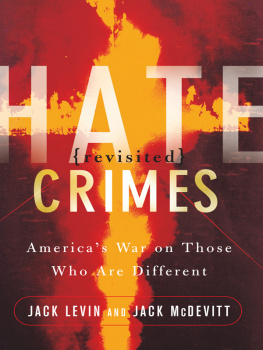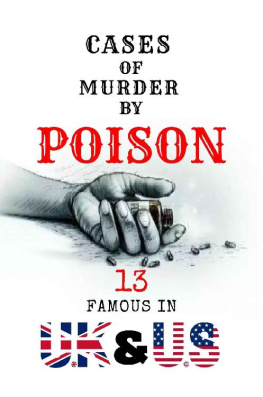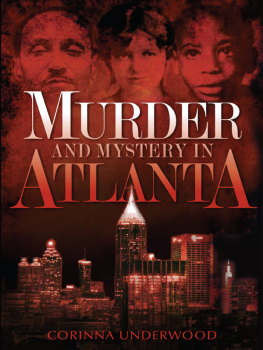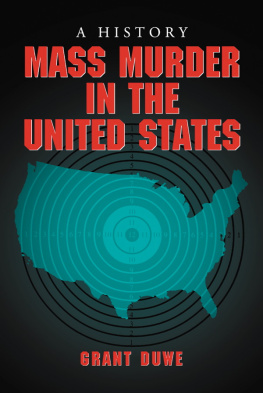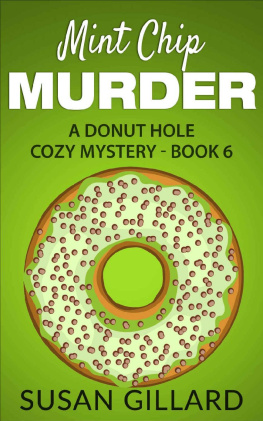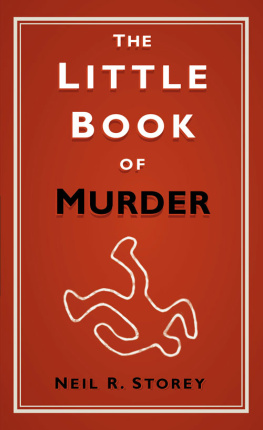Acknowledgments
We owe a debt of gratitude to Gordana Rabrenovic, who directs the Brudnick Center on Violence and Conflict at Northeastern University; Dennis Hilliard, who heads the State Crime Lab for Rhode Island; Oregons Attorney General Ellen Rosenblum; and Captain Paul Zipper of the Massachusetts State Police. A special thank you to Jenna Savage, senior research coordinator for the Boston Police, for her assistance locating appropriate homicide data for the city, and to Darrin Greeley, commander of Boston Polices Homicide Unit, for generously spending his time analyzing recent murder data. We also want to recognize the late Robert Ressler, whose pioneering work with the FBI inspired generations of investigators and researchers in criminology. Finally, we reserve a special thank you for Rowman & Littlefield editors Elaine McGarraugh, Sarah Stanton, and Kathryn Knigge, whose team of professionals worked hard to make this book a reality.
Jack Levin: I am grateful to my wife, Flea, for her amazing patience with me during the process of writing this book on a seven-days-a-week schedule. Murder and hate have been the focal point of my research and writing since the early 1980s, and such topics are not always appreciated around the dinner table or in the presence of our wonderful grandchildrenBen, Jaden, Ethan, Gavin, and Dan. I have tried to reserve my remarks about murder for professional occasions but have also been known to slip inappropriately. Thanks so much, Flea, for putting up with it.
I also appreciate the feedback and encouragement we have received from colleagues at Northeastern University and elsewhere. In particular, I am grateful to my oftentimes co-author Jamie Fox (the well-known criminologist, not the entertainer), Arnie Arluke (another excellent frequent co-author), Cynthia (Shelly) Brown, Betty Brudnick, Ann Burgess, Jay Corzine, Grant Duwe, Arnon Edelstein, Kathleen Heide, Marvin Hertzel, Matt Hunt, Paul Iganski (an outstanding sociologist from across the Pond), Adam Lankford, Brian Levin, Marieke Liem, Joe Ludwig, Jack McDevitt, Jim Nolan, Kenna Quinet, Wendy Regoeczi, Jackie Schildkraut, and Robert Worley. I am also indebted to former students who are now colleaguesArlene Adler, Kevin Borgeson, Stephanie Cappadona, Anjuli Fahlberg, Janese Free, Emma Fridel, Kathryn Garcia, Karen Hayden, Curtis Holland, Eric Madfis, Brett Nava-Coulter, Ashley Reichelmann, and Stas Vysotskyand to the following co-op students: Ralfs Beitans, Colleen Maney, Hanna Sattler, Murat Uzer, and Savannah Wilkinson. Thank you to Scott Wolfman, who has negotiated numerous wonderful speaking gigs for me since the paperback version of Mass Murder: Americas Growing Menace was published in 1991.
Julie B. Wiest: First and foremost, I want to thank my spouse and biggest fan, Christian Zavisca, who was a constant support throughout the writing process (including an endless readiness to bring me coffee and do more than his share of walks with our well-loved Labs, Alice and Nell). I am ever grateful for the mentors who taught me so much about research and writing (and never questioned my interest in studying topics like serial murder and filicide): Betsy Morrow and Dr. Jerry Morrow, Dr. Suzanne Kurth, and Nancy Carroll. Thanks also to the students who have assisted with my research on violence, especially Tyler Walton and Mary Duffy. Finally, thanks to my colleagues and friends at West Chester University (especially Jackie Zalewski, Lisa Huebner, and Marshall Becker) and elsewhere (especially Shelia Cotten, Shannon Davis, and Nahed Eltantawy) who encourage my research and continually inspire me with their own.
Chapter One Planning Is the Payoff
Planning a future event can be a lot like daydreaming. The possibilities are endless, all details are controllable, and every component seems guaranteed to go off without a hitch. That dream ends the moment the event begins, though, and the reality is almost never as fulfilling as the fantasy.
Consider planning a family vacation. Family members spend weeks, months, or maybe even years arranging and anticipating every aspect of the trip. Of course, there are the practical chores to get done like making reservations, buying tickets, finding someone to care for the family pet, and placing a temporary stop on mail delivery. But such tasks also have a way of putting family members in a holiday mood. Then there are the enjoyable occasions to take part in conversations about the upcoming trip with fellow travelers, to read travel books and check online forums for insider tips, and to watch the Travel Channel and documentaries for previews of what may be in store. Decisions must be made, needed items must be purchased, and arrangements have to be completed in advance. In these ways, the vacation as an idea begins much earlier than the trip itself.
When the first day of vacation finally arrives, excitement has reached its maximum. Family members pack up the car and hurry out the door, eager to soak up consecutive days of bliss. But sooner or later, somewhere along the line, all that wonderful planning will be derailed. Perhaps family members dont get along, the weather doesnt cooperate with planned activities, or someone is worried about the family pet staying in a kennel. Maybe someone gets sick or injured, someone else loses their glasses or smartphone, or the hotel turns out to be a real dump. Often, the trip turns out to be much more expensive than first thought. And then its all overtime to go home and back to the mundane activities at work or school.
Many people have experienced the post-vacation blues. In fact, scientific evidence indicates that vacationers are significantly happier before a trip, compared to during a trip or after a trip. Social scientist Jeroen Nawijn and colleagues (2010), for example, compared reported degrees of happiness between vacationers and non-vacationers. They found that vacationers reported significantly more joy compared to non-vacationers before their tripduring the planning and anticipation phaseswith no difference in happiness between the post-trip vacationers and the non-vacationers.
The post-vacation blues is closely related to the post-milestone blues, as special events often follow the same pattern: The planning and anticipation are enjoyable, but the actual experience often is a letdown. People frequently report feeling disappointed or even depressed after graduations, New Years Eve celebrations, and weddings. Such milestone events often just dont live up to lofty expectations. Birthdays may be particularly stressful, as people feel pressured to achieve particular goals by some arbitrary ideal age. They may dread questions like: Youre 30 and not married? or Youre 35 and dont have children? or Youre 40 and havent been promoted yet? Even the most joyous holiday can bring the blues, when they fail to meet expectations. Some people are alone on Thanksgiving or New Years Eve. Others travel for family gatherings and end up disappointed when everyone doesnt get along. The anticipation of a special event can be quite satisfying, but the event itself is too often fraught with conflict or disappointment.
SPONTANEOUS VERSUS PREMEDITATED MURDER
For some killers, a well-planned and much-anticipated murder would be a very special event, indeed. Premeditated murder can be well thought through, prepared over time, and committed after rational consideration of the timing and method of taking a life. While second-degree murder and manslaughter usually can be chalked up to an impulsive loss of temper or spontaneous fit of uncontrollable rage, why someone would plan, plot, and scheme to kill can be more difficult to comprehend.
People often wonder why someone, for a thrill lasting only a short period of timeperhaps just a few minuteswould premeditate murder. This is true whether the act of violence consists of shooting lots of people, blowing up a building, ramming a vehicle into a crowd, or strangling someone to death. If apprehended, the killer might conceivably spend the rest of their life behind bars or, in any of thirty-one states, receive a death sentence. If injured badly in attempting to escape, the killer might spend time in a hospital until recovering enough to go to trial. In other cases, the killer might put a firearm to their own head and pull the trigger, ending their life. If they lack an appetite for self-destruction but still want to die, they might refuse to drop their weapon when confronting the police and commit what has been called suicide by cop.


